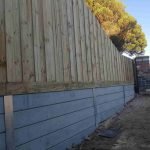Introduction: The Value of Keeping Walls
Retaining walls are more than just structural aspects; they are important for handling soil erosion, developing functional terraced spaces, and boosting landscape aesthetic appeals. As the need for skilled professionals rises, understanding the fundamental capabilities needed to master this field ends up being vital. In this extensive guide, we will look into Essential Skills Every Top-Tier Retaining Wall Contractor Should Have From technical knowledge to job management expertise, we'll explore the breadth of competencies that specify a competent retaining wall installer.

Essential Skills Every Top-Tier Retaining Wall Contractor Must Have
Understanding Soil Mechanics
Soil mechanics is foundational for any retaining wall contractor. The ability to examine soil types-- whether clayey, sandy, or loamy-- enables specialists to select the right materials and design structures that can endure lateral earth pressures.
- Key Concepts: Soil Types: Understanding various soil characteristics. Load Circulation: How loads move through walls. Shear Strength: Recognizing possible failure points.
Material Knowledge
A top-tier retaining wall builder must be skilled in numerous products offered for building and construction. This includes:
- Concrete Sleepers: Resilient and flexible options. H Beams: For heavy-duty applications. Wood Sleepers: Aesthetic appeal with natural materials. Timber Sleepers: Typical in domestic projects. Stone: Adds rustic appeal but needs proficiency in placement.
Design Principles
Contractors need a solid grasp of style concepts, including:
Hydraulic Design: Managing water circulation to prevent disintegration and damage. Geometric Design: Ensuring the wall fits within the landscape aesthetically and functionally. Safety Factors: Incorporating security margins in designs.Project Management Skills
Managing a keeping wall project involves coordinating multiple tasks:
- Budgeting Scheduling Resource Allocation
Effective job management ensures timely completion and adherence to safety standards.
Technical Illustration Proficiency
The ability to read and develop technical drawings is essential:

- Understanding plans is essential for effective implementation. Creating comprehensive schematics enables better communication with clients and workers.
Knowledge of Regional Regulations
Every area has its own building codes and policies. A knowledgeable professional should be:
- Familiar with zoning laws. Able to protect required permits.
Problem-Solving Capabilities
Unexpected difficulties occur frequently on job websites. A capable professional should demonstrate strong problem-solving abilities, such as:
Adjusting strategies based upon unpredicted website conditions. Finding imaginative services within budget constraints.Physical Fitness
Building maintaining walls can be physically requiring work requiring strength and endurance for tasks like raising heavy stones or blending concrete.
Customer Service Skills
Building relationship with customers is important for repeat business. Specialists should develop their customer service abilities by:
- Communicating effectively about timelines and expectations. Being responsive to client concerns during projects.
Team Leadership
As a professional, leading a team efficiently is essential for guaranteeing that everyone works harmoniously toward common goals.
Table of Important Skills
|Skill|Description|| -----------------------|-----------------------------------------------------|| Soil Mechanics|Comprehending soil habits under load|| Material Knowledge|Familiarity with various wall-building products|| Style Concepts|Capability to apply engineering design principles|| Job Management|Managing budget plans, timelines, and resources|| Technical Drawing|Checking out blueprints and developing schematics|| Regional Regulations|Knowledge of building regulations relevant to jobs|| Problem-Solving|Adjusting plans based on site-specific obstacles|| Physical Fitness|Strength needed for physical labor|| Customer support|Structure relationships with customers|| Group Management|Directing staff member towards project conclusion|
Attention to Detail
Small oversights can lead to substantial issues down the line. A careful eye makes sure that every element-- from measurements to surfaces-- is carried out flawlessly.
Safety Awareness
Prioritizing security secures both employees and clients alike. Professionals need to be well-acquainted with safety protocols relevant to building and construction sites.
Adaptability
Construction environments are dynamic; hence versatility is key:
http://felixfencing-contractorsjdbz236.lucialpiazzale.com/why-appropriate-planning-by-your-retaining-wall-builder-is-important Being open to altering techniques based upon brand-new info or technology. Adjusting work practices according to weather or customer feedback.Frequently Asked Questions (Frequently asked questions)
1. What type of training do maintaining wall professionals need?
Training frequently consists of occupation education in building and construction management or civil engineering, along with hands-on experience through apprenticeships or working along with experienced professionals.
2. What materials are best for constructing retaining walls?
The finest product differs by application; however, concrete sleepers are popular due to sturdiness, while stone uses aesthetic appeal however needs competent installation techniques.
3. Can I develop a keeping wall myself?
While DIY tasks are possible, without correct understanding of soil mechanics and material properties, issues may occur that could impact stability or aesthetics over time.
4. How do I pick the ideal contractor?
Look for experience in similar tasks, positive evaluations from previous customers, and clear communication relating to timelines and budget plans before making your decision.
5. Are there particular licenses required for constructing a keeping wall?
Yes! Most towns need permits depending on height or location near property lines; it's important to inspect local regulations before starting any work.
6. For how long does it typically require to set up a retaining wall?
Installation time varies significantly depending on size and intricacy however typically ranges from a number of days as much as weeks when considering all necessary preparations (like excavation).
Conclusion: Building Success One Wall at a Time
In summary, mastering the important skills every top-tier retaining wall contractor need to have not only enhances private professionalism but also contributes significantly to industry standards as a whole. By refining these abilities-- ranging from technical efficiency in product choice all the way through excellent client service-- professionals can ensure their place as trusted professionals within their neighborhoods while delivering stunning outcomes that stand the test of time!
This short article works as a substantial resource describing what it genuinely takes to be successful as a leading figure amongst maintaining wall builders today! Whether you're looking into employing someone or striving yourself towards turning into one-- understanding these abilities will help set you off on solid footing right from the start!